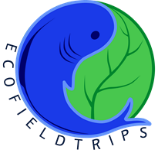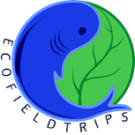As international travel is still restricted making it impossible for most schools to partake in annual fieldtrips, our EFT Bali team has been working hard to develop a number of virtual fieldtrips and literally zoom Bali into classrooms around the World! We have a variety of trips, from CAS to ecology and sustainability, that can be a stand-alone trip or be included in our on-site Singapore trips.
PLASTIC EXCHANGE WITH VILLAGERS
This is one of the best win-win projects here in Bali, Plastic Exchange, addresses and solves 3 issues – Poverty, Environment and Education.
- Poverty – particularly at this difficult time with enormous loss of income and employment due to COVID
- Environment – solving local plastic pollution by collecting plastic garbage instead of burning or allowing it to pollute waterways and oceans
- Education – long term mind set changes towards plastic pollution. People will hopefully no longer tolerate plastic garbage in their villages, rivers and seashores as they atomically remove the discarded plastic to get free rice!
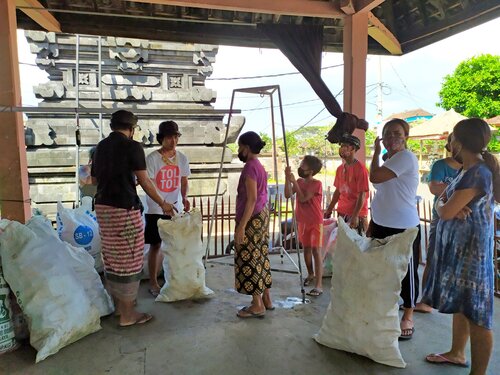
This community-led project gives the local youths the responsibility to create a better future for themselves and at the same time tackling a major environmental issue – plastic in the environment. Local youths manage the village collection point where families bring their collected plastics. Once centralised in the village, the plastic trash is sorted and brought to an industrial processing plant to be recycled into plastic pellets. The barter exchange means that for every 4kg of plastic, 1kg of rice is given out to the families. In many villages, as much as 1-2 tons of plastic has been removed. With such high volume of plastic comes the need for sponsorship to help pay for the rice.
Schools can immerse themselves virtually in the project and sponsor the rice for a village. Live interaction, speaking to the village youths as well as the families that exchange their plastic for rice ensures a lively and fun session whilst supporting this excellent project.
“ENGLISH IS FUN” – INTERACTIVE CONVERSATION CLASS FOR CAS GROUPS
Initiated by our Ecofieldtrips Founder, Bridget Hedderman, “English is Fun” is a conversational class to teach English to children in a fun and interactive way. She was driven by the realisation that the children in her Bali village had been out of school for the past 18 months due to COVID-19. Now, the children come to the Bamboo House, our EFT activity centre in Bali, where Bridget, her friends and our interns teach English.
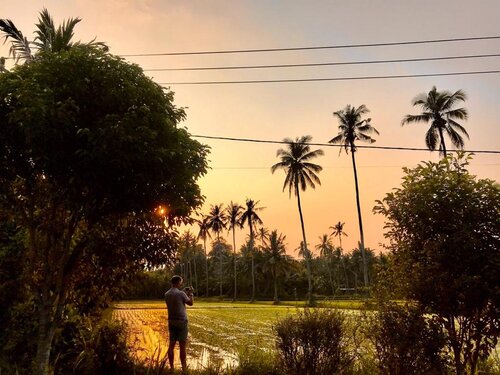
Our proposed programme for CAS groups is to set up a “buddy system” where international students can be paired with a child to learn English. The ability to commit to a longer term weekly interaction will benefit the children greatly. The age and proficiency varies greatly amongst the children in the village but they are delighted to share about living in a Balinese village.
RICE ECOLOGY
Rice is one of the most important crops in the world, especially in Asia where it is the staple food and vital to feed a huge population. Rice cultivation in Bali involves ecology, culture, and religion. For example, the Subak system – the water management system in Bali paddy fields – is managed carefully by the farming communities and has been operating unchanged for over a thousand years! This unique sustainable irrigation system involves rice terracing, water channeling and rice temples in over 20,000 hectares! The water management is under the authority of the priests and address the Tri Hita Karana Philospohy.
- Connecting with people
- Connecting with nature
- Connecting with the spirit world.
Join the EFT Bali team and the farmers’ family in the rice paddy fields of Jati Luwih for an exceptional live virtual experience or spend a day working alongside the children at The Astungkara Way to really understand how Bali culture and agriculture coexist in harmony!
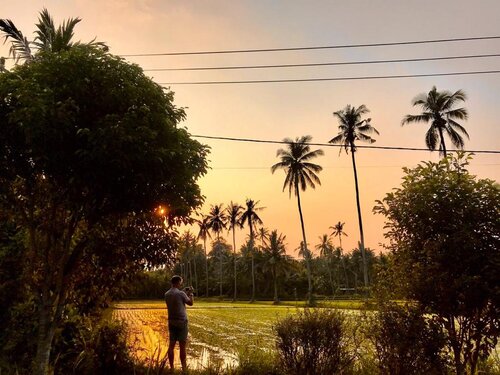
PERMACULTURE GARDEN SHARING BY DYATMIKA SCHOOL, BALI
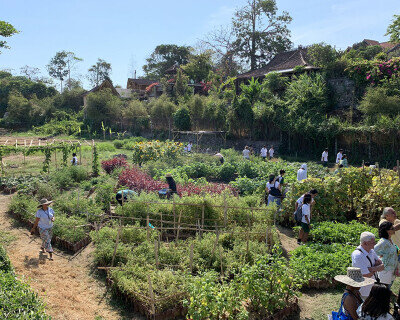
At The Dyatmika School, students run a community permaculture garden that allows them to actively engage with the environment. The day to day care of the permaculture garden is managed by the students and funds from the sale of the fresh produce goes towards various fundraising projects or is invested back into the garden.
The Dyatmika students are keen to share their knowledge, concepts and practices of permaculture (the development of agricultural ecosystems intended to be sustainable and self-sufficient) through Google Meet channels with any interested international school.
